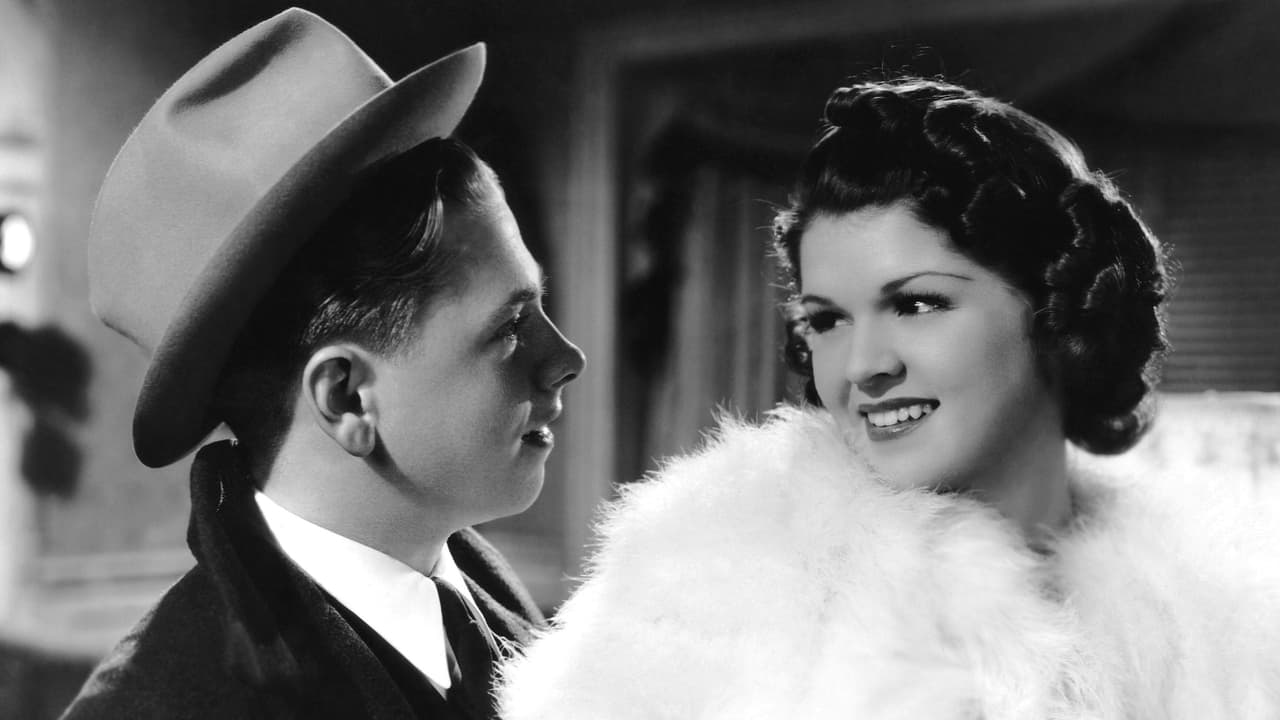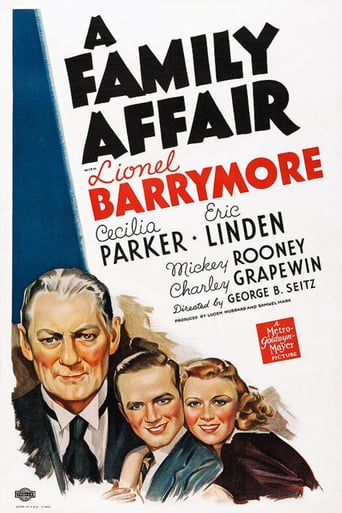

Directed by George B. Seitz, this average comedy drama was the first in the Andy Hardy series, and the only one to feature Lionel Barrymore as Judge Hardy before Lewis Stone would take over the role for a dozen or more movies made in the late 1930's through the middle of the next decade.Director Seitz, and actors: Mickey Rooney as Andy, Cecilia Parker as Marion Hardy, Fay Holden (taking over for this film's Spring Byington) as Mrs. Hardy, Ann Rutherford (replacing Margaret Marquis) as Polly Benedict (Andy's girlfriend), and Sara Haden as Aunt Milly, continued the series which began with You're Only Young Once (1937).The characters come from Aurania Rouverol's play Skidding. This film's focus is the judge, in lieu of Andy (whose name is usually in the title), who is struggling to be reelected against popular opinion because of his stance on a civic improvement issue. Julie Haydon plays Andy's older married (to Allen Vincent's character, Bill Martin) sister Joan, whose character doesn't continue in the series. Neither Bainter nor Haden is given much to do in this one.The town of Carvel, population 25,000, is about to get a coup, an aqueduct that promises to bring jobs and money to their small community. City leader Frank Redmond (Charley Grapewin) and the project's executive Hoyt Wells (Selmer Jackson) are upset that Judge Hardy has filed a restraining order against its construction because of a complaint by the town's newspaper owner J. Carroll Nichols (Robert Emmett Keane, uncredited). The judge protests that he's only following the law, but his campaign manager Oscar Stubbins (Harlan Briggs) warns him that, with the upcoming election, now is not a good time to go against the will of the people.But that's just the beginning of the judge's concerns: his eldest daughter Joan has separated from her husband and his other daughter Marion has returned home from college with a beau, Wayne Trent (Eric Linden), who's an engineer that's come to find work on the aqueduct project. Meanwhile, Andy is upset that his mother is "forcing" him to take a girl he hasn't seen from his childhood to a party, only to be pleasantly surprised that Polly has grown up quite nicely. Eventually, each of his daughters becomes part of the judge's conflict regarding the aqueduct project: Marion, who is angry with her father because Wayne can't get a job, and Joan, because Redmond and Wells threaten to expose an incident which, on the surface, looks like she had an affair, in order to besmirch his character before the vote. Andy tries to calm them by reading his sisters their father's oath of office.Through some sort of magic, a conversation we the audience aren't privy to, the judge gets Joan's husband Bill to stand up for her at the nominating convention, and then he reveals a secret clause in Wells's contract which would make Carvel beholden to other communities down river if the aqueduct project begins as planned. So, the judge saves the day and is unanimously reelected while all is well on the family front too.
... View MoreThis was the first of the Andy Hardy series, in which Mickey Rooney is the spry young man who croons about cars and is attracted to girls, although he doesn't understand them, or why he's attracted to them. Rooney seems not to walk. He darts from place to place, his skull spins on its axis, hair flopping from side to side. I'd love to have his adrenals.This being fundamentally one of MGM's "happy family" movies -- nobody could foresee the myriad sequels -- Rooney is ranked fourth in the credits, and the pater familias is not the stolid Lewis Stone but the whiney-voiced and more expensive Lionel Barrymore. But this established the framework for the imitations that were to come. Today, it would be a pilot for a TV series.Rooney actually doesn't have all that much screen time. He's attracted to a young girl whom he innocently offends, there is a rift in their relationship, and it's resolved at the end. Ditto for his sister and her boyfriend. Exciting car/truck chase on an unpaved mountain road.The main plot thread involves community pressure being put by the citizens of Carvel on Judge Lionel Barrymore to permit the construction of an aqueduct that will mean lots of jobs for the town. (This is 1937, when jobs were very nice to come by.) Barrymore is a man of principle and insists on making his own judgment about the aqueduct. This earns him the disrespect of his neighbors and there is a great protest against him until, with an imaginary trumpet fanfare, he mounts the podium, waves the mob into silence, and finally explains why he opposes the construction.The apologia takes him about three minutes which, had he spent that time doing the same thing ten minutes into the movie, there would have BEEN no movie.But no matter. The audience applauds wildly, even his most determined adversaries. Judge Hardy wins the election, accepts the Nobel Prize with gratitude and humility, and is offered a long-term movie contract.
... View MoreThis is the first of the Hardy family movies from MGM. While Mickey Rooney starred in all of them, most of the family members (other than Cecilia Parker who appeared in most of the films) were replaced by other actors in the next installment of the series. Perhaps Lionel Barrymore and Spring Byington were considered too valuable to waste in this series and were needed by other projects--whatever the reason, this is the only film where you'll see them playing Andy's parents. He also has a sister in this film who doesn't appear in future films.The main theme of the film is Judge Hardy's job. It seems that when the Judge does his job according to the law, he ruffles some feathers and the town big-shots threaten to prevent his re-election. Despite repeated warnings, the ever-decent Judge is a man of the law and refuses to bend. This makes it hard on his family, as people who were once their friends begin to act like big dumb jerks.The secondary theme is the oldest Hardy daughter. It seems that her marriage is on the rocks and she's come back home to her parents. Later, in order to try to pressure the judge, this daughter is pulled into the fight--as innuendos and half-truths are tossed about by the town scum.As for Andy, he's really an ancillary character here--even though later films make him THE star. In fact, many of the later films have his name in the title due to his pre-eminence in the cast (such as "Love Finds Andy Hardy" and others). Because of this, the film is much more a film about Judge Hardy and is supported by his family.The overall package is excellent--especially since it is really a B-movie plot with an A-picture cast. Enjoyable and pleasant--I can see why this led to more films like it.
... View MoreThis was a charming movie which I unfortunately tuned into half way through, shown on Turner Classic Movies in the wee hours on May 19, 2004. I'll look for it again and tape it. I was surprised to see Lionel Barrymore as Judge Hardy. Very creditable performance. Probably he wasn't used again in the resultant series because of his ill health, but I'm just guessing. It was indeed a treat to see pre-December Bride Spring Byngton (how many of you readers can name her co-stars in that sit com?). And who can name the Western series she was featured in some 40 years ago? I digress. Turner has just started Judge Hardy's Children with Lewis Stone taking his rightful place as Judge Hardy. It's 4:32 am and I think I'm hooked on the students of Carvel High. Check out A Family Affair, you'll like it. Ted Turner must own the rights, so how about an Andy Hardy DVD box?
... View More